Are you caught up in the ‘rat race”, or living a life similar to Niall who spent years flying from city to city to only see the airport? Niall (from Ireland) and Paari (from India) left their highly successful careers as lawyers in Dubai behind to move to Italy and buy Poggio Golo — an agriturismo and winery. Was it the Tuscan sunset or some much-needed time with their phones turned off that ‘sealed the deal’?
As lawyers they made precise plans, but once in Italy they learned to adjust the “to do” list and adapt to slow living. Read until the end of our interview to find some helpful tips about buying a property in Italy. However, in the meantime, enjoy following Niall and Paari’s journey from “what if” to “here we are”!
And, if you enjoy Italian wine (like I do) celebrate their desire to be custodians of the land they love, and create single-vineyard estate wines at their carbon-neutral winery.
Maybe you don’t want to move to Italy, but you can still leave your worries and hectic life behind for a week or two, by staying at Poggio Golo. Let us know if you go.
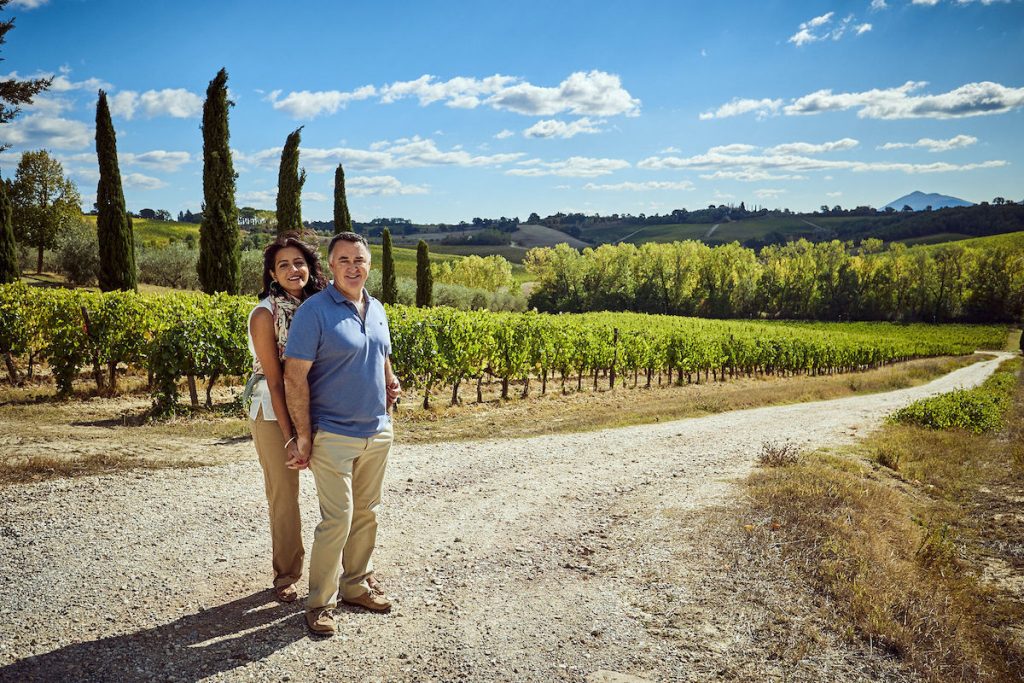
(1:22) Where are you originally from?
Niall: I was born and raised in Ireland. In 1989, I left Ireland to work overseas and haven’t really gone back. I’ve worked in London, Spain, and then about 26 years ago I moved to the United Arab Emirates.
Paari: I’m originally from India and my family moved around a fair bit there until I was about 12 years old. After which we moved to Dubai and I finished high school there. I then went to the UK for studies, then the US, and eventually back to Dubai. I started my legal career there – that’s when Niall and I met.
Between us, we’ve been to quite a few places, but the origin of this story started in Dubai.
(3:12) Let’s talk about the “boy meets girl” part.
Niall: I didn’t have to go anywhere. She came to me! I was working for an international law firm in Dubai and then Paari joined it. I walked into her office a few weeks after she had joined the firm and introduced myself.
Paari: We were friends for about 10 years and eventually we got together. We’ve been married for about seven years. We moved to Italy three years ago – bang in the middle of the pandemic.
Niall: When we got married we didn’t have a honeymoon, so we decided to take a sabbatical. For nine weeks we turned off our cell phones, which was obviously a shock to the system. The majority of the time we spent in Italy. We traveled around, stayed in agriturismi, and spent a lot of that time in Tuscany.
Paari: That was really the start of the dream The dream started about 3 years before we made the move.
Why not?
The dream was “why not”? Why not start an agriturismo and winery? When you say it out loud, you think it is impossible. Lawyers being lawyers, we set out and made a plan, starting with what we needed to do today and set “smart goals”. The actual steps that we took to achieve our dream are the same as what we all do to achieve our goals.
(8:06) Talk about the moment when you decided to give everything up.
It was probably a sunset. We were living in Dubai where there is a hectic pace of life. We were corporate, M&A lawyers — deal junkies. We’d been to Italy many times on holiday. But on this occasion it was literally telephones off and we slowed down. Instead of passing through Italy, we stopped and stayed, and chatted to people.
We were staying at an agriturismo and at sunset with a glass of wine, we talked about how it was so different here to the lives we were living.
(10:32) Looking for something different.
Paari: In terms of lifestyle, we were looking for something different. We both spent more than 25 years in Dubai. We still have loads of friends there. The aspects of Dubai are fantastic. However, we were looking for a slower pace of life, time to really ‘smell the roses’. It just so happens that where we were, at that stage of life, we could step away and do that.
Niall: I do get the other side. A lot of Italians have asked us, “You came from Dubai to live in Montepulciano?” We came from a teeming metropolis of 4 million people to only 15,000.
One reason is that five years ago, I did 50 flights in a year. You go to some amazing locations around the world, but you’re sitting in an office. From the office you go to a hotel and then to the airport. I would be in meetings wishing that Paari was with me, and I didn’t feel that I was in that particular country.
Maybe it’s the ‘far away fields are greener’ thing. Dubai is the land of opportunity, so it may be the best choice for an Italian looking for work abroad.
(13:01) Why wait until retirement?
Niall: From our perspective we thought, “do we ever want to retire?” We wanted to do something different and experience a different type of life.
Paari: We never wanted to be in a position where we said, “what if?” I don’t think that anyone has said, “I wish that I spent more time in the office.” We didn’t want that feeling.
(13:59) Planning the move.
Niall: Being lawyers, we were prudent. We sat down and made lists and asked, “can we really afford this?” Then, we decided what our ‘Plans B, C, and D” were – and all plans were Italy. We spent three years looking at properties and came at different times of the year. The Tuscan sunsets in August are amazing, but you need to look at the same area in other seasons like January.
Paari: We did as much as we could to prepare ourselves.
(15:11) Do you feel that being there made a big difference when looking for properties?
Niall: Absolutely. We learned a lot during the process especially when deciding what we were looking for. Create your dream parameters but know that you might not get everything. If you get three out of five, it’s good. There will be something else that you never thought of, but it’s really important. If you have a young family, you’ll be immediately looking for places where there’s good schooling or good healthcare. However for us, it was good wine.
We did our research.
Paari: At that stage, we did not have a clear idea of that we were looking for. We made several trips to Italy: first to Chianti, then Umbria, and Tuscany. We looked at various houses, ones with vineyards, and agriturismi. Then we narrowed it down to what would make us happy.
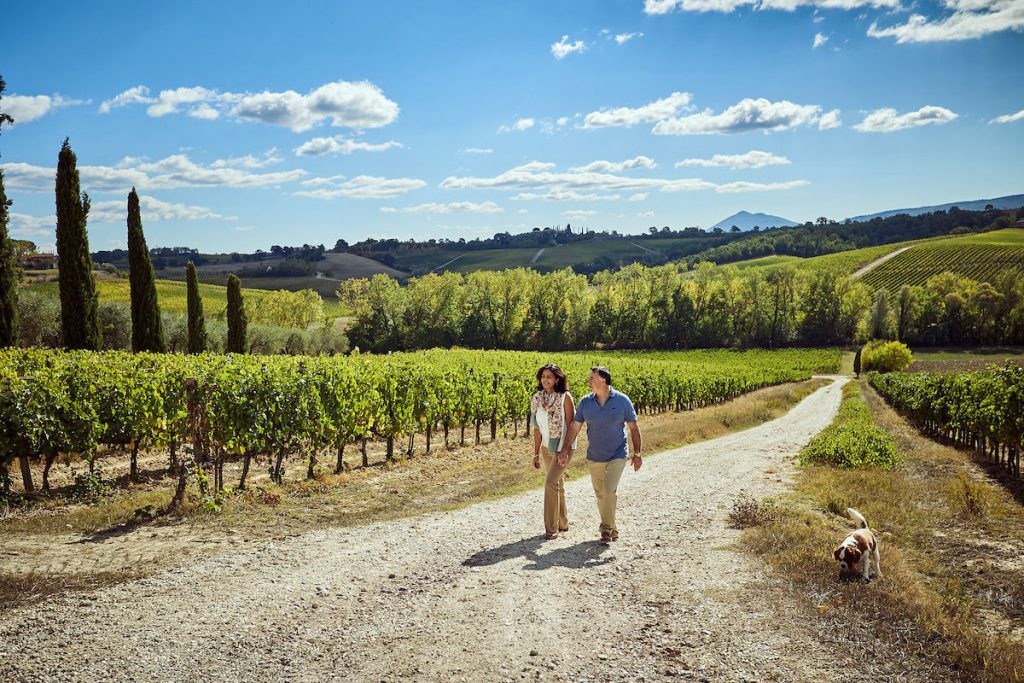
(17:27) Were you purposely looking for a place with a vineyard?
Niall: Yes. I say that I’ve been in the ‘wine business’ for 30 years, but I was down streamed as a consumer. Now we’re trying to move up stream and become producers. We wanted an agriturismo and enough vines around us so it wasn’t just a hobby. However, not a mammoth undertaking. Initially our plan was to live in the agriturismo, but ultimately we didn’t do that. I’m pleased about that because we would have been living ‘over the shop’.
The anchor was that we wanted to be in a good wine producing area.
(19:05) What happened to your plan in progress during Covid?
Paari: It was actually a double whammy for us. We planned to move here as we did in July 2020, but not to the house where we are now. Upon arrival, we found out that the property that we had planned to buy, the deal fell through at the last minute. As you can imagine, that was shocking news.
It became not just about finding a vineyard, but a home to live. We had temporary accommodation and then we continued looking for a home. We were very blessed because we had a fantastic real estate agent. After six months of looking for an agriturismo and vineyard, we decided on Poggio Golo and bought it in June of 2021.
We were very conscious of the fact that Italy was hit hard during the pandemic. So, we were also conscious of the rules and did things within the confines of those restrictions. Everyone was so aligned.
(24:42) What makes Italy great?
Paari: When people talk about what makes Italy great, there is of course, the stunning scenery, food, wine, and everything. For us, it’s the people and the community that we are now a part of. Those times were challenging. Had we not had the people around us who supported us, it would have been much harder.
Three years later, we’ve managed to not only start our business in Italy but grow us as well. That happens when the people around you help you achieve what you want to achieve.
(25:40) Residency, and adapting to life and business in Italy.
Niall: Our oenologist told us from the start that you need a ‘squadra’ (team) if you want to get something done. He has been our guardian angel.
I’m Irish and therefore a European Union citizen. Paari has residency rights through being married to me.
Paari: That was the easiest part of the settling in process.
[Note that Dublin is not in the UK, but part of the Republic of Ireland and, thus, the EU.]Niall: There are very few restrictions about starting a business in Italy. In fact, Italy wants to attract investment. Once we had the residency sorted out, there is the bureaucracy that you have to resolve like a driver’s license, carta d’identità, Tessera Sanitaria, getting internet connected etc.
All of the mundane things of life are built from scratch and in a foreign language. That was certainly challenging, but we found so many good people like our banker. He’s helped us in so many ways beyond banking.
(28:32) Did you restore your property?
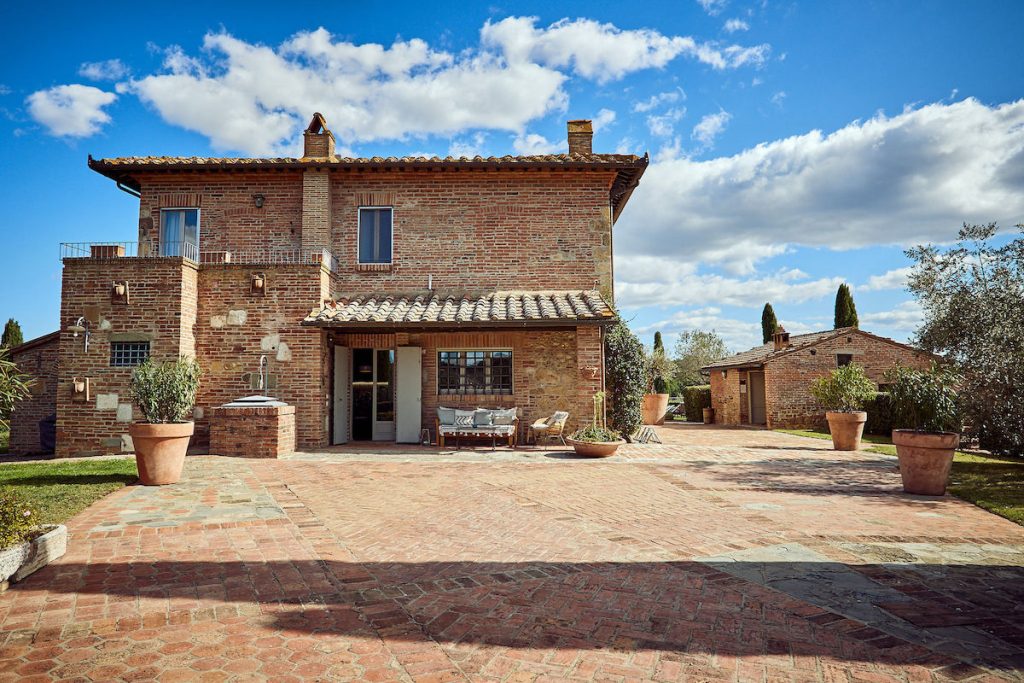
Niall: More or less. Because of Covid, we’re glad that we didn’t buy a (home restoration/renovation) project because the logistics during this time were upset. It was difficult to meet people. Had we bought a project, we’d be waiting another two years just to get the laborers, craftsman, and materials.
Poggio Golo was in pretty good shape, but we did do a very frantic month of redecorating.
Paari: We did a light touch for the first season and then more work in the second season. This year we’re doing more improvements. Thankfully, we didn’t have to do a major restoration. It’s in a beautiful position and a property where you forget what is happening with the house once you are at the location, surrounded by such stunning scenery.
Thankfully people love what we’ve done with the place, but it still pales in comparison to the outside.
Niall: Poggio is a hill and we sit on top of this hill. We have a panoramic view. The villa is rented to groups and can be rented for the week. Our groups arrive in various states. Sometimes they are exhausted, or they’ve already been traveling in Europe for a couple of weeks. They’ll check in on Saturday, but when we check in on them a couple of days later, they have decompressed.
They’ll tell us their favorite spots for morning coffee.
Paari: It is a very calm and peaceful place. They feel that very quickly after check-in.
(32:00) From beginning to end, tell us what to expect when we visit?
Paari: We have two villas. The main villa can accommodate 12 people. It has six bedrooms and six bathrooms. Two of the rooms are ensuite and there are two bathrooms on the upper level and two on the ground floor. It’s 400 square meters or about 4,500 sf. Right next to it is the pool and then on the other side, the smaller villa. It can accommodate another six people and has three bedrooms and 2.5 bathrooms.
Niall: The smaller villa is an extension of the larger one. We do not rent it to a separate group to maintain privacy. There is loads of space to be either with the group or find your own private area. It’s for families or groups of friends. We’ve had multigenerational groups.
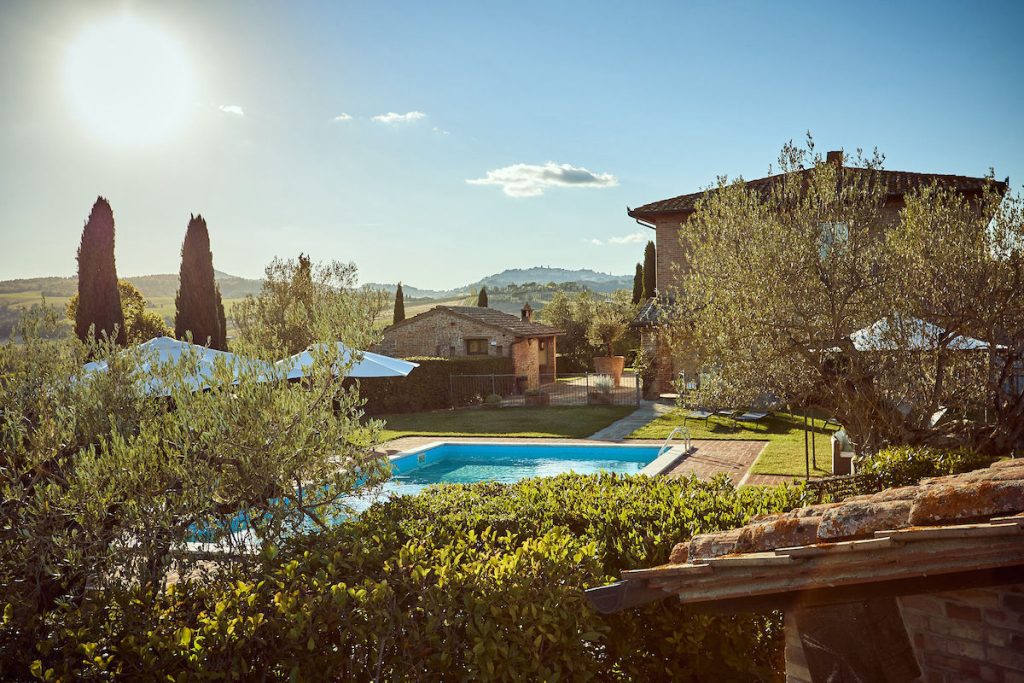
(34:10) Where are you located and what is the main access point?
Paari: We’re about 15 minutes away from Montepulciano and 7 minutes from a town called Acquaviiva. To reach Poggio Golo, most people fly into Rome or Florence. We’re about 2.5 hours by car from Rome and 1.5 hours from Florence. They could take a train from Rome or Florence to Chiusi-Chiancianoi. From there it takes about 20 minutes to get to Poggio Golo. We highly recommend that you rent a car because that’s the best way to explore the area. It offers you flexibility to get around little towns. The roads are beautiful and easy to navigate. There’s great signage. In the countryside, driving is pleasurable.
Niall: We’re also close to the A1 Autostrada. It’s a good place to base yourself and do a daytrip to Florence or Siena. There are so many beautiful places and each one has a fabulous restaurant and local wine.
That image of Cypress trees up and down the roads is real. We say rent a car and take it easy. It doesn’t matter what side of the road you’re on because the Italians go down the middle anyway!
To get the best out of the countryside, you need to be mobile.
(37:25) What is an agriturismo?
Paari: An agriturismo is basically a working farm. You have to be producing something on the farm. In our case, it’s grapes and olives. It gives tourists a chance to stay on a farm. What’s different from an agriturismo than a B&B is that you get to experience what it means to be (a) in the countryside and (b) on a working farm. You’ll see the farmers attending the vineyards while here. We give our guests who come in September, the opportunity to participate in harvest. Last year it was such fun for everyone. Our guests told us that it was a once-in-a-lifetime experience.
(40:22) Was the farming staff part of the property when you bought it?
Niall: No, the previous owners just sold the grapes. They did not make their own wine. We’ve built our team and there’s a local family that works on the farm. We have four full-time employees and during the harvest, we bring in extra people. When it’s time, it’s time and you have to harvest the grapes. It’s a frantic period and everyone is exhausted, but in a great mood.
Paari: At the end of the harvest, we have a long table with lunch for everyone. It’s a great day!
(41:47) Where is your wine being made?
We use a facility nearby. We use their equipment, but our people make the wine. Towards the end of next year, we’ll be building our own cantina. We’re in the process of getting all of the permissions and clearing the space. Whenever I’m online, I’m finding ideas on cantina design.
Paari: We’re also in the process of converting the vineyard into BO (biodynamic) and not use harmful chemicals. We want to respect the land and what it’s giving us in the most natural way possible. It’s one that absolutely has to be done.
Niall: We feel that we are the custodians of Poggio Golo. For example, the winery will be as carbon neutral as possible. We’ll be using natural insulation materials and will be installing solar panels that will effectively take us off-grid. It’s incredibly precise and regulated, but in a positive way. We do use treatments, but they sit on the skin of the grape and don’t penetrate it. When we can buy treatments from a certain list and quantity. We have to account for the elements that we haven’t used up.
It’s good to know that the Italian system takes it that seriously. So, if you see “BO” on the bottle, you know that it’s been made the right way and has been checked at various stages. Without notice, we will get inspections and they walk through the vineyard and test the grapes.
(46:18) From wine consumer to winemaker: are you still learning?
Niall: Oh yes! Every day and week and hopefully, always will be. This is part of the excitement and terror. We have both done Wine and Spirits Education Trust (WSET) 2 and we’ll go on to WSET3. We have people around us who are absolute experts at what they do. Our oenologist is a hugely experienced.
Paari: It’s important to know what you don’t know. We’re qualified as lawyers and obviously we’re not going to go to any wine producing area and pretend like we know how to do this or say, “we can take it from here”. So, one of the first things we did (even in the run up to buying Poggio Golo) was make sure that we had the professionals around. They advised us on what we needed to do put life into the vineyard again and start producing the grapes to the standard that we wanted. Eventually, we wanted to make a wine that we are happy with.
It would be arrogant for us to think that we could do it all ourselves. We are blessed to have all of these good people around us.
We were in the sweet spot of ignorance. Humility, being respectful, and listening to people who know more than you are key. It’s a collective effort.
(50:23) Is your goal to make single vineyard, high-quality wine?
Niall: Yes. From the vendemmia (2021) harvest our Rosso di Montepulciano is now available. Later on this year, we’ll have a Super Tuscan. Next year our Vino Nobile which is currently sitting in beautiful French oak barrels and going through the aging process. It’s checked frequently every week and we’ll be bottling it next year. That’s going to be a big day.
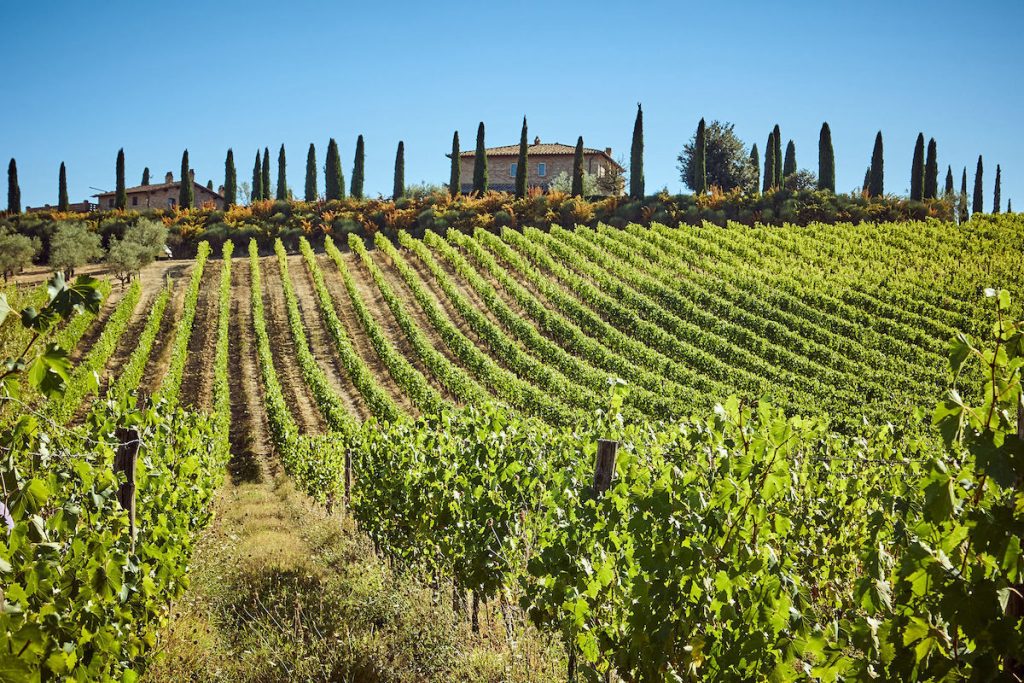
(51:45) How many hectares of vineyards do you have?
Paari: The total property is 12 hectares and we have almost 6 hectares of vines. We have 250 olive trees.
Niall: Each hectare should give us at least 5,000 bottles of good quality wine. We are not going for mass producing, but quality over quantity. The oldest part of our vineyard is 70 years old. It produces less, but the quality is the best. The rest are 22 years old. They are now ‘hitting their straps’ as far as production quality.
(53:47) How many seasons have you been running Poggio Golo?
Paari: This is our third season.
Expats in Italy
(54:17) Are you proficient in Italian?
Paari: I feel quite proficient. I started learning a little before moving her and we both kept up lessons while living here. I think between us, there’s no situation that we can’t handle. The first bit of advice when moving to Italy is to always learn Italian as soon as possible.
It’s a beautiful, but hard language and takes a lot of practice. You have to put in the work.
Niall: We’re in Italy. When you speak to Italians, they are very patient and like that you are making an effort to learn their language. It’s the interaction that we have with people.
Paari: Once you live here and are running a business here, you’re thrown in the deep end. You have no choice. That takes some of the shyness away that you may experience if only coming as a tourist or student.
Niall: We’ve had many conversations where we speak Italian, but Italians respond in English so they can practice.
Paari: It works really well.
(57:44) Where do your guests come from?
Paari: The majority of our guests come from the United States. We get large groups like families or friends, or both. I would say that 80% come from the U.S. The remaining come from Northern Europe like Belgium, Netherlands, Germany, and Austria. Italians are not a big demographic because during the summer, we have a minimum stay of seven nights. In the off season, it’s four nights.
Niall: We are receiving inquiries at least six months ahead of time. It’s generally the trip of a lifetime or a special celebration. We can organize private chefs for our guests or offer advice on what restaurants to visit. We have an app that helps people who are staying on the property.
Paari: The app provides guests with all of the information that they would possibly need for during their stay. We’re very proud of our little app!
Niall: It’s got some highly sensitive information like the best parking spots in Montepulciano!
(60:02) Is Poggio Golo a good place for a destination wedding?
Paari: Yes, we do get inquiries. This year we have guests who are attending weddings elsewhere but are staying with us.
[Watch the video version to hear Niall and Paari tell us more about what visitors can expect.]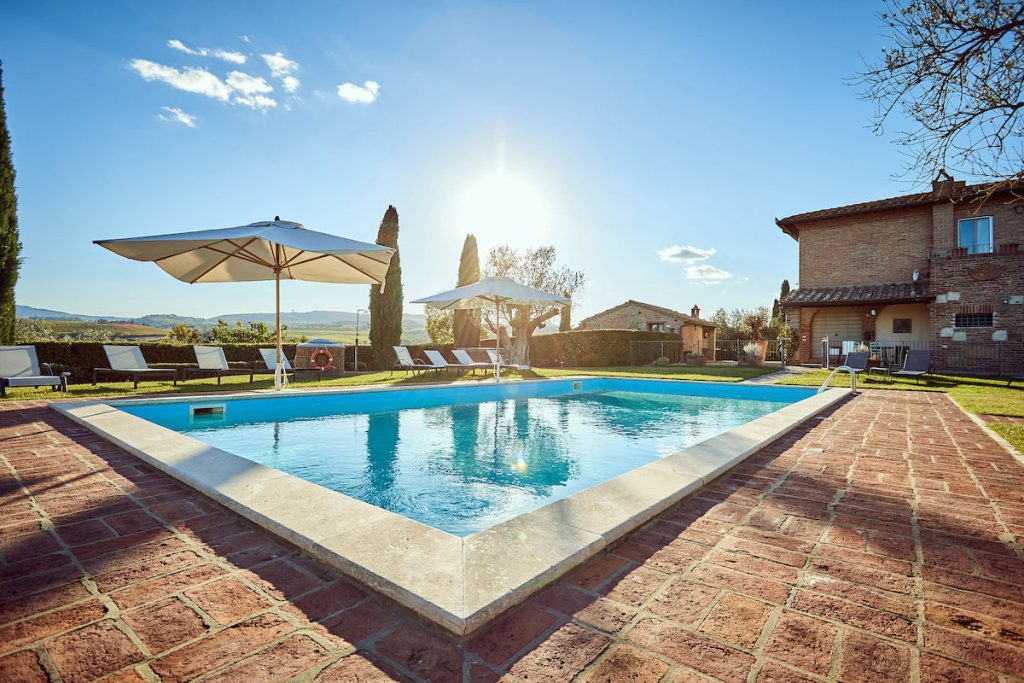
(60:05) Share some tips about anyone wishing to buy a property in Italy.
(1) Find a good agent.
Niall: Get a good agent. We met a variety of agents and we found one in the end who we were happy to work with. We gave her parameters of what we were looking for. A good agent is a broker in the middle.
[Note: Agents in Italy represent both the buyer and seller.](2) Speak to a commercialista.
Paari: Related to that is that you should speak to a commercialista early on in the process. This person is the advisor on all things number related. He/she gives you all the advice that you need to figure it all out from a tax perspective. This way you have a good grasp on what you are really in for.
(3) Hire a lawyer and notary.
Niall: Find yourself a good lawyer and notary: two separate people. A notary works differently in Italy than in other parts of the world. The property transaction takes place in the notary’s office. He/she will read the documents to you and if you don’t speak Italian, they will arrange for a translator. The notary also checks the lawyer’s and agents to make sure, for example, that the property has been surveyed. Tuscany, in particular, is known as being strict for its planning and property inspections.
Again, a good notary will find a good balance between buyer and seller.
(4) Get opinions, but not advice from social media groups.
Paari: There is a temptation to go on the net and get the information yourself. I see people asking very specific questions on social media groups which may seem helpful. However, the best avenue to get the advice that is really going to help you, is to work with professionals.
Niall: More government services are moving online, but what you need is someone to interpret the rules and explain how they are applied in your area (comune).
(5) Take your time.
Niall: Don’t fall in love with the first property that you see. If you are coming for the summer as a tourist that’s fine. However, if your plan is to move here, visit off-season. The winters can be harsh and it gets dark early. See your intended location during all four seasons.
(6) Have patience.
Paari: Have patience and forget the kind of timelines and pace that you had in your previous life. Accept that you are in a different place where things work differently. Once you accept that you are not where you used to be, everything becomes a lot easier and more pleasant.
Niall: We used to wake up and say, “here’s our list of ten things that we are going to do today” and we would get six done. As lawyers, that to us is a failure! To improve our success rate, we have limited the number of things to get done to five. It was part of the adjustment process. We did not come from a city to Tuscany to live the way we had before.
We have recalibrated our expectations of ourselves. It was a process that did not happen overnight.
Lastly, it’s easier to buy a house than a car!
(60:14) What is your definition of an expat?
Paari: We’ve both been expats for a long time. I’ve been one since I was twelve. Niall has been one since he 1989. So, we are used to the feeling that comes from being an expat. For me, it’s someone who has left everything that they know and have gone out to seek a life of adventure, fun, and fulfill a dream. Living this life broadens your horizons in a way that I don’t think any other things do.
Niall: We visited Italy many times. The first time that we felt understood more was when we came here on a sabbatical. Living here is different than visiting. The expat goes out to learn, explore, and experience. I will always be Irish (particularly when there’s a rugby match on), but I love living in Italy!
Paari: What has been really important is to make connections with Italians. Sometimes expats stick with expats in their comfort zone and only speak English every day. But we made this life choice and mindfully make connections with people from here – whether that’s in Tuscany or in Italy as a whole. I’m proud that we have done that.
I lived in five countries, and I truly believe that I have little bit of each of them in me. I am sum of those five countries. The core is very much Indian, but there are layers on top of that.
(60:20) What do you miss about your countries of origin?
Niall: Rain in August! For me, what I miss about Ireland are the people: family and life-long friends. A place is a place, but it’s the people that make it home. Rugby and tayto crisps.
Paari: For me it’s the food. Indian food generally, but because we spent so much time in Dubai there’s definitely things that we miss from there too. For example, having everything on your phone. Here we basically need to get everything by getting into the car. Also, different cuisines, like Thai food.
Niall: I go to a market that has the most unbelievably fresh vegetables that perfume the car. I take pictures and send them to my sister in Ireland just to make her jealous! And she thinks that they have been photoshopped!
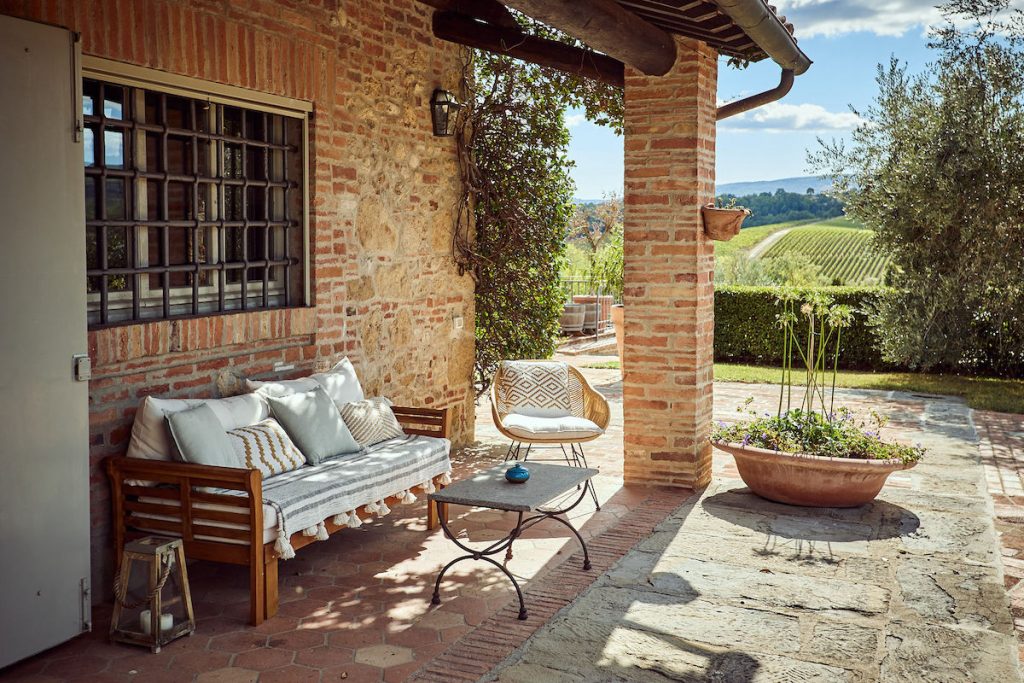
(60:22) What’s next?
Paari: I would say that right now our focus is to make a success of the winery and build our team further. We want to be the owners/custodians of Poggio Golo and step back and let our team drive the day-to-day running.
Niall: We’ll be making super high-quality wines which are unique to Montelpulciano. We’ll be doing it in our state-of-the-art cantina and in an environmentally-friendly and as close to a zero carbon way that we can. Also, I will have an electric tractor!
Visit Poggio Golo
Website: https://poggiogolo.it/en/

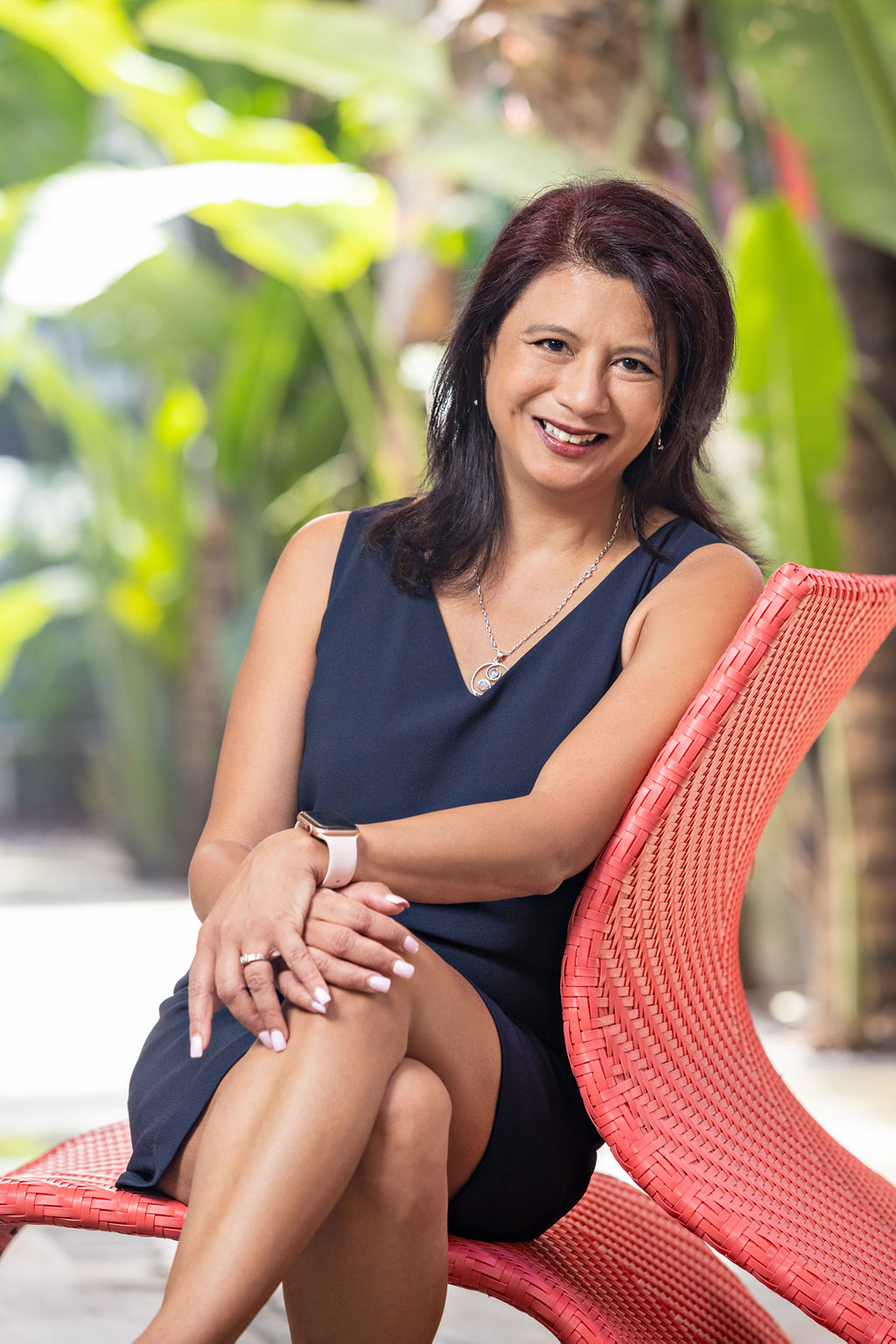

Greetings Paari & Niall.
Looks as if you live in Paradise – I am quite properly “Gelosa”!
My friend and I are Italophiles – have visited many times but taking the step to relocate is another thing. I speak Italian – probably about like an 8 year old (if I’m being kind) but am still taking lessons!
In 2019 we spent 3 months in Rome and LOVED it so much. We will go back again in spring of 2024.
I’m wondering if you have any good techniques, advice, tips or better yet, connections to find a property in Rome for 1, 2, or 3 months? Last time we used a combination of AirBnB and a company called iFlat. this time it seems more complicated than ever. We are both over 60, want a place with 2 bedrooms, decent kitchen and an outdoor space. Would love to be in one of the areas that tourists don’t know about like Prati, Pigneto or that one I can never remember that begins with an M…
I am happy to pay for your time or the time of an agent who might be interesting in helping us. Our budget per month would be between 3000-5000 euros I think.
Thank you so much. Cathy Grisham
Hi Cathy! Thanks for finding Live in Italy Magazine. Can you send me an email and maybe we can refer you to a couple of agents. It’s probably best to work with one. ~ Lisa lisa@liveinitalymag.com